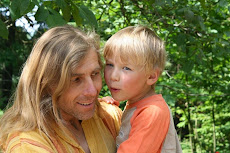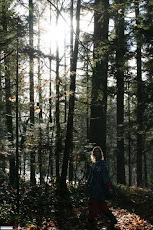 #3 in a series of responses to Globe&Mail comments
#3 in a series of responses to Globe&Mail commentsWhile this extremeness is not a workable solution for everyone, I think we all can use a reminder that the rat race is not the most important thing in the world. We all should examine our wants and needs and try to reduce our cost of living while not reducing our quality of life.
- "Leaving Sooon's" comment on the Globe and Mail article
Anyone who thinks we've reduced our quality of life didn't see our breakfast this morning. Galen breathed in clean misty morning air as he gathered eggs (and some lunch apples from the root cellar), Sarah went downstairs for a jar of strawberry jam to put on homemade bread, and Zekiah skimmed the whey off the yogurt I made overnight. Tasty, healthy, earth-friendly and convenient - in my books, that's quality.
While we haven't reduced quality of life, we have given up some conveniences. Pizza takes 20 minutes to roll the dough and prepare instead of 2 minutes to order by phone, and the dried beans from last summer's garden need to be simmered in the slow-cooker all day instead of poured from a can. The fire needs feeding every hour. We were the only bikes in the rainy schoolyard yesterday. But convenience isn't quality.
We've given up some comforts. The house isn't as big, the towels off the line are crunchy, the family holiday thermarests aren't quite as soft as the Holiday Inn beds. The thrift store clothes aren't always broken in in just the right places, and the cutlery is rarely matching. But comfort isn't quality.
The more we've "given up" along this long journey, the more clearly we've been able to define and refine our personal definition of quality. For our family, quality means prioritizing people: family and community. It means living sustainably, in a way that doesn't harm the world our grandchildren will inherit. It means living fairly, consuming and investing in systems that value and support rather than exploit other people and other nations. And at times when all those values are in alignment, the result is the most important definition of quality of life: Joy.
Through this lens, the quality of our life has continually improved as we become braver and more creative. These days, instead of my secretary being my most constant companion, I see my children and wife more clearly and more often. Carbon karma is down and community involvement is up. No TV means more time for writing, reading, creativity and play. Chopping wood and jogging to school has me looking not a day over 41. When neighbour Bob strolls up to the fence he finds me ready to chat. I am what I eat - local, organic, small-scale, non-GMO, sustainable, healthy and juicy and delicious.
I agree that "this extremeness is not a workable solution for everyone," if "extremeness" is referring to this particular type of life we've created. There have been times in my life when working 80 hours a week deeply satisfied my values and contributed positively to the world. We lived passionately and consciously in fenced-yard urban houses for several years. For the first 40 years of my life I would have readily agreed with 'Cousin Voltair's' comment, "Thanks, but no thanks. Trading the rat race for milking cows twice a day, 7 days a week, and all the other chores required to maintaining the lifestyle described here isn't necessarily an improvement in my books."
Another Globe and Mail reader, calling himself "ipitythefool", wrote:
Subsisting on canned goods through the winter is not my idea of fun. While I respect these people's choices, that lifestyle is not for me. I like my intellectual desk job thanks. ;)
Thank you for your respect, 'ipitythefool' (how's that for a contradiction in terms :) I genuinely hope that your intellectual desk job is (as mine was for many years) true to your values, brings you Joy, and brings positive energy into the world. Not everyone needs to enjoy my canned goods (though don't knock em till you've tried em). Everyone does, however, need and deserve to find their definition of quality of life, and their own path to reach it. You may well have found that path, or the journey may surprise you as much as becoming a chicken farmer has surprised me.
While writing this, Galen burst into the room, excitedly announcing, "Papa! We're using this old-fashioned cheese grater. You turn this wooden handle, we're holding it down inside this little box and there's this little thing that turns it down, then you turn the handle and this blade spins around and the cheese grates, or it crunches it up. Do you want to come see it?" It took me 2 hours this morning to ponder my way through the quality of life, and my 8-year-old found it in a cheese grater.






